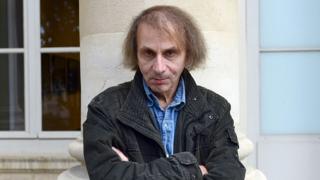Controversial writer wins France’s highest honour
The controversial writer Michel Houellebecq is to be awarded France’s highest honour on Thursday.
President Emmanuel Macron will present him with the Légion d’honneur at the Elysée Palace in Paris, with former president Nicolas Sarkozy attending.
A polarising figure, Mr Houellebecq has been hailed as France’s greatest living writer for his sharp observations of modern society.
But his critics accuse him of misogyny, racism and Islamophobia.
“It seems to me today he makes the most of other peoples’ hatreds in his books,” Guardian Books editor Sian Cain told the BBC. “Whether that’s talent or opportunism, I don’t know.”
Who is Michel Houellebecq?
The 63-year-old was born Michel Thomas on France’s Indian Ocean island of Réunion in 1956.
He moved briefly to Algeria until going to live with his grandmother in Paris at the age of six, after his mother moved to Brazil to live with a new boyfriend. His pen name, Mr Houellebecq, was his grandmother’s maiden name.
The author is a friend of many of French society’s movers and shakers, having met both Mr Macron and his predecessor Mr Sarkozy. Carla Bruni-Sarkozy once recorded a song version of one of Mr Houellebecq’s poems.
France’s former first lady posted a picture on Instagram of the writer and his new wife Lysis on their wedding day last year and thanked him for “letting us share your happiness”.
Mille vœux de bonheur à Lysis et à Michel Houellebecq pour leur merveilleux mariage et merci de nous avoir laissés partager votre bonheur …. « Et l’amour où tout est facile, où tout est donné dans l’instant, il existe au milieu du temps, la possibilité d’une Île… »
A post shared by Carla Bruni (@carlabruniofficial) on
End of Instagram post by carlabruniofficial
Mr Houellebecq began writing poetry in the 1980s before winning international renown for his second novel, Les Particules Élémentaires (published as Atomised in the UK and The Elementary Particles in the US) in 1998.
The nihilistic work sold hundreds of thousands of copies and won him praise and awards from literary critics, but he drew criticism for the graphic sexual descriptions in the book.
Why is he so controversial?
Ms Cain says she did not read any more of Mr Houellebecq’s works after finishing Atomised.
“I have no interest in reading anything more by him,” she says, arguing his “misogyny” was not a comment on society as some believe, but instead “just him venting his own feelings of maternal rejection on the page”.
A New York Times review called it a “deeply repugnant read” that presented “an utterly bleak picture of contemporary culture”.
But the Guardian’s Nicholas Lezard praised it as “a bold and unsettling portrait of a society falling apart” when it was released – although adding that there is “not too much doubt that Houellebecq is an unpleasant person”.
Mr Houellebecq’s 2001 novel Platform, about sex tourism in Thailand, featured more graphic sex scenes, but it landed the novelist in court for its criticism of Islam and its description of an Islamic extremist attack on a resort in South East Asia.
The novel came out the year before the Jemaah Islamiah militant group killed 202 people on the Indonesian island of Bali, with some calling it prophetic.
Judges acquitted Mr Houellebecq of provoking racial hatred on the grounds that he has the right to criticise religions. But mosques throughout France and the country’s Human Rights League criticised the writer.
For his 2010 work La Carte et le Territoire (The Map and the Territory) he was awarded the prestigious Prix Goncourt, but his sixth novel, Soumission (Submission), proved to be his most controversial.
Set in 2022, it depicts France under Sharia (Islamic) law without gender equality and a protagonist who eventually decides to convert to Islam and to practice polygamy.
“Certainly a feminist is not likely to love this book,” Mr Houellebecq told the Paris Review ahead of the book’s release, saying he did not consider himself a misogynist.
He also told the interviewer that “we have extended the domain of ‘racism’ by inventing the crime of Islamophobia”, while saying the Koran “turns out to be much better than I thought”.
But its release date, 7 January 2015, was also the date of the 2015 Charlie Hebdo terror attacks in Paris.
The satirical magazine featured a cartoon of Mr Houellebecq on its front cover on the day of the attack, and the writer was placed under round-the-clock police protection in its wake.
What has he been up to lately?
Mr Houellebecq’s latest work Sérotonine (Serotonin) was released in January and is seen as a novel about France’s “gilets jaunes (yellow vests)” protests, even though it was written before the demonstrations began.
“He has a knack for speaking to the political moment,” The Times’ deputy book editor James Marriott told the BBC, adding that he is not a fan of the author but “interested in him”.
He has broadly refused media appearances since the Charlie Hebdo shooting, although Mr Houellebecq recently published an article for Harpers magazine calling US President Donald Trump “one of the best American presidents I’ve ever seen,” although “pretty repulsive”.
He also praised the UK’s decision to exit from the European Union, writing: “The British get on my nerves, but their courage cannot be denied.”
Mr Marriott meanwhile says the author is “needling people” following “a French political tradition that nowadays would be called ‘trolling'”.
“You hope he doesn’t believe all that stuff,” Mr Marriott says. “Novelists say slightly outrageous things and that plays a role in helping us examine and question our beliefs.”
“He’s not that original,” he adds. “People like the idea of him.”
Source: Read Full Article



